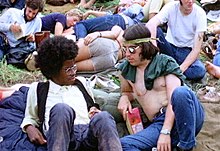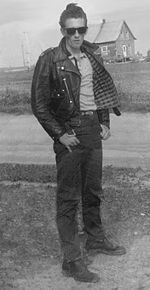Social effects of rock music
The popularity and worldwide scope of rock music resulted in a powerful impact on society in the 20th century, particularly among the baby boomer generation.
As the original generation of rock and roll fans matured, the music became an accepted and deeply interwoven thread in popular culture.
[3] Many observers saw rock and roll as heralding the way for desegregation, in creating a new form of music that encouraged racial cooperation and shared experience.
Many rock musicians, including John Lennon, Paul McCartney, Mick Jagger, Bob Dylan, Jerry Garcia, Stevie Nicks, Jimmy Page, Keith Richards, Bon Scott, Eric Clapton, Pete Townshend, Brian Wilson, Carl Wilson, Dennis Wilson, Steven Tyler, Scott Weiland, Sly Stone, Ozzy Osbourne, Mötley Crüe, Layne Staley, Kurt Cobain, Lemmy, Bobby Brown, Buffy Sainte Marie, Dave Matthews, David Crosby, Anthony Kiedis, Dave Mustaine, David Bowie, Richard Wright, Phil Rudd, Phil Anselmo, James Hetfield, Kirk Hammett, Joe Walsh, Julian Casablancas and others, have acknowledged battling addictions to many substances including alcohol, cocaine and heroin; many of these have successfully undergone drug rehabilitation programs, but others have died.
The straight edge philosophy of abstinence from recreational drugs, alcohol, tobacco and sex became associated with some hardcore punks through the years, and both remain popular with youth today.
In the mid-1960s of the UK, rivalry arose between "Mods" (who favoured 'modern' Italian-led fashion) and "Rockers" (who wore motorcycle leathers), each style had their own favored musical acts.
This dilemma has created friction between musicians and fans, with some bands going to great lengths to avoid the appearance of "selling out" (while still finding ways to make a lucrative living).
In some styles of rock, such as punk and heavy metal, a performer who is believed to have "sold out" to commercial interests may be labelled with the pejorative term "poseur".
On the other hand, managers and producers may progressively take more control of the artist, as happened, for instance, in Elvis Presley's swift transition in species from "The Hillbilly Cat" to "your teddy bear".
Ray Charles left behind his classic formulation of rhythm and blues to sing country music, pop songs and soft-drink commercials.
Other musicians, notably John Lennon and Yoko Ono, were vocal in their anti-war sentiment both in their music and in public statements with songs such as "Imagine", and "Give Peace a Chance".
On occasion this involvement would go beyond simple songwriting and take the form of sometimes-spectacular concerts or televised events, often raising money for charity and awareness of global issues.
Rock and roll as social activism reached a milestone in the Live Aid concerts, held July 13, 1985, which were an outgrowth of the 1984 charity single "Do They Know It's Christmas?"
[8] Iron Maiden, Metallica, Ozzy Osbourne, King Diamond, Alice Cooper, Led Zeppelin, Marilyn Manson, Slayer and numerous others have also been accused of being satanists, immoral or otherwise having an "evil" influence on their listeners.
For example; The Edge and Bono of U2 are a Methodist and an Anglican,[9] respectively; Bruce Springsteen is a Roman Catholic;[10] and Brandon Flowers of The Killers is a Latter Day Saint.
[11][12] Carlos Santana, Ted Nugent, and John Mellencamp are all other examples of rock stars who profess some form of Christian faith.
In his writings and speeches, Noebel held that the use of such beats in music was a communist plot to subvert the morality of the youth of the United States.
Even within this localized musical subgenre, however, the arson attacks against Christian churches and other centers of worship were condemned by some prominent figures within the Norwegian black metal scene, such as Kjetil Manheim.




